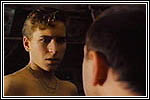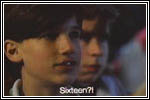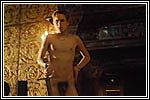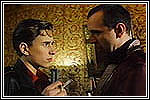 |
Vol 0, No 15
1 January 1999 |
|
|
Going Down and Out in Prague and Prerov Wiktor Grodecki's Mandragora Andrew J Horton Prague has changed rather a lot over the past few years. Many might think for the worse, as the city is now a major centre for drug abuse and prostitution. As capitalism has kicked in, the provincial push and the urban pull has been too great for many youngsters to resist. Whilst there may be fortunes to be made, the new arrivals are rarely the ones to make them and the metropolis is far more likely to strip them of their dignity than nurture them as human beings. Such stories are rich pickings for a film director, and Wiktor Grodecki is one director who, with his film Mandragora (1997), has been tempted by the age-old theme of the corrupting city. Marek is pretty much your average Czech kid. He hates school, he hates his hometown, Prerov, and he's not overly-enamoured with his father, who, as fathers are prone to, thinks Marek should be hard at his homework while he himself is off down the pub. Marek can't face it any longer and, after dramatically stealing a leather jacket, hops on a train to Prague. He soon runs out of money and even his jacket gets stolen from him. He only has one asset left to fall back on: he's cute - very cute.
Mandragora (named after a plant which grows under the gallows fed by the sperm of dead men) pushes back boundaries in what films have shown on screen, certainly in the context of the Czech Republic. Whilst Paul Thomas Anderson's Boogie Nights (1997), another work on the sex industry with a moral to it, showed us Mark Wahlberg's truly superlative member, Mandragora gives us a good glimpse of the rather more modest proportions of young actor Miroslav Caslavka posing in his birthday suit on a rotating pedestal. The film also refuses to hold back on the dialogue, with the rent boys discussing their work in graphic detail. You can't accuse Grodecki of lack of research in these matters: the film was based on real stories which he encountered in the making of two documentaries shot over a period of three years:Andele nejsou andele (Angels but not Angels, 1994) and Telo bez duse (Body without Soul, 1996).
However, for all the pushing back of boundaries, Mandragora is a highly middle-class, middle-of-the-road film. Despite the explicit nudity, and graphic conversation about sex, this is the sort of film that every parent would want to show their teenage children. Its moral is that no matter how drunk your father gets and shouts at you and no matter how much of waster he really is, you're best off sticking at home because they love you really and you love them too, you just don't realise it. Now, that really is sick and perverted. Perhaps, it's no surprise that the five awards which first launched Mandragora onto the festival circuit came from one of the most smugly middle-class cities in Europe - Geneva. Boogie Nights might have been totally against the sex industry, but it never left you with any doubt that running away from such an awful mother was the right thing for its hero to do under the circumstances. Grodecki's failure to make a film about the prostitution of teenage boys, which takes up the point of view of the real victims of this tragedy shows how little understanding he has of the human suffering he witnessed in this sad trade. Andrew J Horton, 1 January 1999 (republished 22 November 1999) Further Surfing To get hold of the film on video (without subtitles), go to The Czech Video Centre. If you want a copy with English subtitles, you may have to wait a little bit as there seems to be, at the time of writing, trouble with getting distribution rights. I have my doubts about the integrity of the company which seems to want to distribute the English-language version of this film, since Mandragora is advertised alongside its "Naturism Collection". Find it yourself if you're that desperate. As with any Czech film, there are the usual run of reading options, all in Czech: Production credits at Czech Movie Heaven... In addition there are some general discussions of sex in films. Kinofil's feature on the issue is little more than a list helpfully supplied with lots of pictures. If you want something more intellectual, then try the Czech academic journal Biograph, which has a rather more weighty treatment of the theme. Finally, if you really enjoy bad Czech films, you might want to participate in the "Worst Films" discussion group. All postings are in Czech.
|
|
![]()
Copyright (c) 1999 - Central Europe Review and Internet servis, a.s.
All Rights
Reserved




